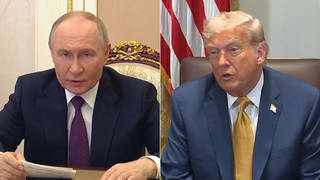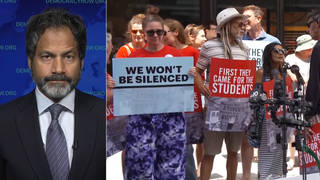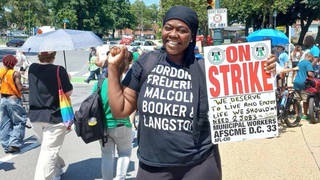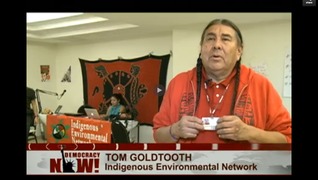
Guests
- Anne PetermannExecutive Director of the Global Justice Ecology Project.
- Speakers at REDD forum in Cancúnfinancier George Soros, Walmart chairman Rob Walton, longtime conservationist Jane Goodall, and World Bank president Robert Zoellick.
A controversial proposal to protect forests worldwide is on the table at the U.N. Climate Change Conference in Cancún. Reducing Emissions from Deforestation and Forest Degradation (REDD), would include forests in the emerging carbon markets, allowing governments and corporations to purchase permits to protect forests as a way to offset the carbon released into the atmosphere through its industrial pollution. Though often reported as a means to stop deforestation, there is widespread opposition to REDD from environmental and indigenous groups. We speak to Anne Petermann of the Global Justice Ecology Project. [includes rush transcript]
Transcript
AMY GOODMAN: We’re broadcasting from the U.N. climate talks in Cancún, Mexico. Is REDD the new Green? That’s R-E-D-D, which stands for Reducing Emissions from Deforestation and Forest Degradation. Well, it’s a mouthful, but to talk more about REDD, which is being talked about all over the U.N. climate talks, we’re joined by Anne Petermann, executive director of the Global Justice Ecology Project.
There’s a real division, not only between rich countries who are very much for this and others, but also in the progressive community. You have a number of indigenous groups that are for REDD and also many who are opposed. Anne Petermann, talk about exactly what REDD is without using the U.N. diplo talk.
ANNE PETERMANN: Yeah, to avoid the jargon, yeah, as you said, it’s supposed to be about reducing emissions from deforestation. Unfortunately, if you really look at the agreements and what’s behind it, you find that that’s not exactly what REDD is designed to do. REDD is really — has been designed as a way for — and is being pushed by the United States — as a way for industries and Northern countries, industrialized nations, to avoid actually reducing their emissions at the source. So, countries and companies can continue polluting by saying that they’re protecting forests somewhere else that will supposedly sequester the carbon that they’re putting out into the atmosphere. Unfortunately, there’s absolutely no credible science behind the notion of offsets. So, in fact, what’s going to happen is, because they’re not reducing their pollution, because they’re not reducing their carbon emissions, global warming will continue, which will inevitably damage, destroy and completely eliminate forests, eventually, if global warming isn’t stopped.
AMY GOODMAN: Wait. Now, so explain how it works. Take a company and how they want to continue polluting somewhere, and then what exactly they do to get the carbon offset?
ANNE PETERMANN: Well, the idea is that instead of, for example, BP or Shell reducing their own emissions, they can buy some forests in another place, say Brazil, and protect the carbon in that forest so that that supposedly offsets the carbon that they’re putting into the atmosphere. But in order to actually secure that carbon and to say, OK, the carbon in this area is not going to be disturbed in any way, it requires making sure that there aren’t any people who could use that carbon, you know, either for shelter, for firewood or anything like that, which is why a number of indigenous groups are opposing this, saying that this is going to displace indigenous communities. This is going to have very serious impacts on indigenous communities while allowing pollution and global warming to continue.
AMY GOODMAN: On Wednesday, several of the world’s most prominent backers of REDD met in Cancún at a public forum. The speakers included the U.N. Secretary-General Ban Ki-moon, financier George Soros, Walmart chairman Bob Walton. The longtime conservationist Jane Goodall spoke by video, as did the Nobel Peace Prize winner Wangari Maathai, all in support of REDD. World Bank president Robert Zoellick gave the keynote address.
ROBERT ZOELLICK: It’s absolutely clear that REDD-plus enjoys very broad support all around the world. And it’s pretty easy to see why. It offers some very significant opportunities, as Dr. Goodall said, to achieve multiple goals: trying to mitigate climate change, of course, but also improving local livelihoods, protecting species, restoring biodiversity and ecosystems, while improving local livelihoods. Now, you’ve just heard hope from Dr. Goodall that the foot soldiers of the forest protection are expecting REDD-plus to open a new area of opportunity for habitat protection and community development, as well. So we really need this Cancún COP meeting to adopt a decision on REDD-plus.
I also want us to get the absolute most we can out of REDD-plus, both for people and for biodiversity. We know that REDD-plus will not work if it doesn’t benefit people on the ground, especially indigenous people and local communities. And we also realize, however, that REDD-plus is one of the best chances we have, maybe one of the last chances we have, to really save our rich biological diversity.
AMY GOODMAN: That’s World Bank president Robert Zoellick. Anne Petermann, respond. He’s talking REDD-plus here, and he’s emphasizing Jane Goodall, who many people see as one of the leading conservationists.
ANNE PETERMANN: Well, the issue with REDD-plus, the issue with the REDD scheme in general, is that it’s not addressing the underlying drivers of deforestation, and therefore it’s not going to solve the problem. The other organization that I work with, the Global Forest Coalition, just did a multi-year study of what are the actual drivers of deforestation around the world, and REDD is not addressing those. So even if you successfully protect a forest in, say, the Congo, if you haven’t eliminated the pressures to — the pressures for wood, for example, you’re just going to push that logging into a different forest. And they call that “leakage” in U.N. speak. So you have to address these underlying causes of deforestation, and REDD just plain old doesn’t do that.
And Robert Zoellick, of course, can hardly be considered an altruistic force. He’s one of the architects of the Project for a New American Century that led to the war on Iraq. The World Bank has for years coerced developing countries to go along with trade regimes that are not in their best interest. So this is just one more in a long series of schemes that the World Bank uses to control developing countries.
AMY GOODMAN: The billionaire financier and philanthropist George Soros spoke in Cancún on Wednesday and said the REDD program to save forests has been transformational in countries like Indonesia.
GEORGE SOROS: It’s transformational. It’s really changing the way the forests were treated. Basically they were being mined like a natural resource, like a gold mine or oil or whatever. It was mining, basically. And now it has to be preservation, but it has to be a model of economic development based on preservation. It’s also transformational because you don’t only preserve rainforests, but you also have to restore the peat land, which is — so that it stops emitting CO2. And it can be done, and I think it can be done cheaper than any other form of mitigation. So, I’m ready to invest in it. And I think private enterprise, particularly on the restoration end, has to play a major role.
AMY GOODMAN: That was the billionaire financier and philanthropist George Soros speaking here in Cancún. Anne Petermann, his points?
ANNE PETERMANN: Well, the key thing that I think that he mentions is that this will be one of the cheapest ways to reduce emissions. And what that means is, it’s more expensive for a company to actually figure out how to reduce its emissions at the source, so it’s much cheaper to just go buy a forest somewhere. But if you actually look at how much money it would take to stop deforesters from doing the deforestation, the studies have shown that it’s more like $2.7 trillion per year that needs to be spent if you really want to stop deforestation. So it is in fact not a cheap way to do this. And I want to know where this funding is going to come from, if it’s not going to come from the private sector and from the markets. And once you get the markets involved, then, you know, all bets are off, as far as the impacts on poor people, people who live in these forests, who are never benefited by the markets.
AMY GOODMAN: The last question that I put to President Correa about how can you control companies — I mean, when you say to offset, you know, the gas emissions you’re responsible, the greenhouse gas emissions, you buy a forest somewhere, who controls that? And that’s what indigenous people here who are opposed to REDD are so concerned about. Are they going to be thrown off their land because someone sold it out from under them?
ANNE PETERMANN: Well, that’s exactly it. And most of the forested land that’s left on this planet is inhabited by indigenous people, who have very carefully taken care of those forests. But in many cases, the land titles to their ancestral lands are very unclear. So that opens the door for investors to come in and take over those lands and use them for these carbon offsets. And as I mentioned, in order to actually ensure that the carbon is not disturbed, there has to be — you have to ensure that there’s no human activity on that land.
AMY GOODMAN: But Correa said, “We can control these companies.” I mean, and here is a president, of Ecuador, who has been dealing with the massive pollution of, for example, ChevronTexaco. They’ve all joined in this lawsuit on behalf of the indigenous people against ChevronTexaco, so they know the power of these corporations.
ANNE PETERMANN: Well, if you look at these actual climate negotiations, I mean, industry is everywhere. I mean, they’re invited into the back rooms. They’re invited to the receptions. I mean, industry has incredible influence in these climate negotiations, whereas the environmental NGOs, like the ones that I work for, are being increasingly marginalized, shut out and ignored. And I think that is a very clear example of what REDD is going to mean. We are very concerned about the rights of indigenous peoples being respected, and there just isn’t — aren’t those safeguards in REDD.
AMY GOODMAN: I want to play for you the comments of the legendary conservationist Jane Goodall. She recorded a video message for the major gathering of REDD supporters in Cancún. Listen carefully, as the audio is a bit hard to understand.
JANE GOODALL: We all know that deforestation around the world is contributing to the warming of our planet, but that’s not the only reason why it’s important to protect forests. We must also protect them because they support a great wealth of animal and plant species. And destruction of this habitat is leading to the extinction of many species every day. So, if we protect our forests, we not only slow down climate change, but also help stop the continuing loss of biodiversity.
AMY GOODMAN: That was Jane Goodall. Anne Petermann with us, director of the Global Justice Ecology Project. Your response? I mean, she is someone who many people turn to when it comes to principles of conservation.
ANNE PETERMANN: Well, I think she and many other people are grasping at REDD because they’re so desperate. I mean, the world’s forests are falling at an alarming rate, and something has to be done. Unfortunately, REDD is not going to be the solution, and that’s what I think people don’t understand yet. But a perfect example of why REDD will not be the solution was the World Forestry Congress in 2009, where the World Bank got up in front of this plenary session full of timber industry executives, foresters, forestry students, and explained very clearly, ”REDD will be extremely beneficial for forestry” — not for forests, for forestry. REDD is going to benefit the largest forest destroyers in the world, while displacing the people that have traditionally protected the forests for all their lives. And that is a serious problem.
AMY GOODMAN: Finally, Rob Walton, the chairman of Walmart, traveled to Cancún this week to take part in Wednesday’s event promoting REDD. Walton is the eldest son of Sam Walton, the founder of Walmart, and one of the wealthiest men in the world. He said sustainability has become a key issue for Walmart.
ROB WALTON: We made a commitment recently to — I’ll go a little broader and then come back — three areas for sustainable agriculture, which is one of our initiatives. And one of them is to support farmers and their communities, and another is to reduce waste in the agricultural supply chain and help growers produce more food with fewer resources. And the third area is to focus on sustainable — sustainably sourced key agricultural products.
AMY GOODMAN: After Rob Walton, the chair of the board of Walmart, spoke, Democracy Now!’s Mike Burke attempted to question the Walmart chair.
MIKE BURKE: Mr. Walton, can I ask you a question?
ROB WALTON: Yeah.
MIKE BURKE: From Democracy Now! radio and TV in New York.
ROB WALTON: No, no, no.
MIKE BURKE: Just one question, sir.
ROB WALTON: No, no, no.
MIKE BURKE: “Sustainability” seemed to be the key word today of your address. And I’m wondering — talk about economic sustainability in what you do to small businesses.
WALTON’S ASSISTANT 1: Sorry, sorry. He’s had a long day.
WALTON’S ASSISTANT 2: Let him be. Let him be. Come on, let him be.
AMY GOODMAN: Well, the attempt was made. That was Mike Burke questioning — attempting to question Rob Walton, the chair of the board of Walmart, here in Cancún. And Anne Petermann, I want to thank you very much for being with us. Your website address?
ANNE PETERMANN: It is globaljusticeecology.org. And we’ve been blogging from here at climatevoices.wordpress.com, following all of the events that are happening here.
AMY GOODMAN: Thanks so much.













Media Options